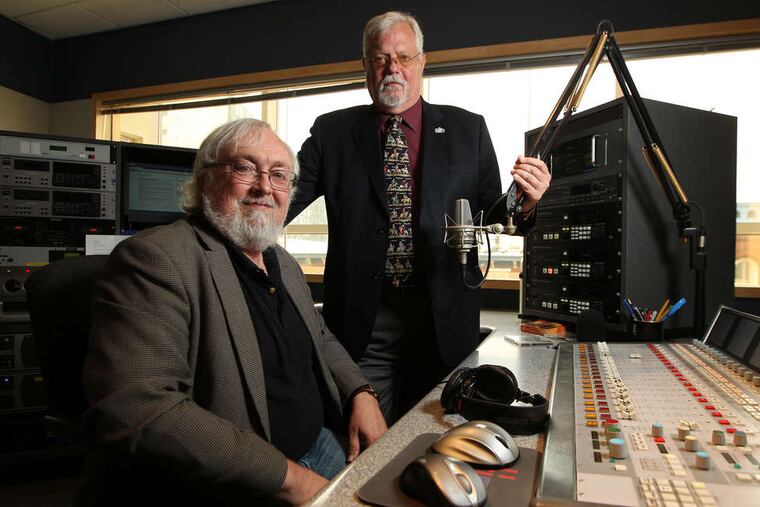With a half-day of classical, 'RTI gives what listeners love
It is the reliable affliction of many a classical listener that things are not as good as they once were. When was that exactly? No matter how old you are, it's usually just before you came in.

It is the reliable affliction of many a classical listener that things are not as good as they once were. When was that exactly? No matter how old you are, it's usually just before you came in.
Proof that a fine old era had fallen came when Philadelphia's longtime classical station, WFLN, changed hands and dropped classical in 1997. The accepted interpretation was that an important cultural marker had been breached. A city of this size without a full-time classical radio station would be something less than a real city, the vox populi lamented.
Our radio market, the eighth-largest in the United States, still does not have a full-time classical radio station, but the technology and delivery of music have changed so dramatically in the last decade and a half that definitions of what's full-time and even what's radio have rendered the question moot. (Is online streaming from a radio station website considered radio? What about satellite radio? Pandora?) In nearly every measurable way, WRTI-FM (90.1), the Temple University station that stepped in behind WFLN with classical programming for half the day, has proven not merely worthy, but, in fact, superior to what we had before. Eeyores may have to accept defeat just this once; classical music is better, and better served, since WRTI came to the rescue.
It's important to remember that classical stations across the country have often given way to other formats. The rise in valuation of radio properties in the late 1990s was too tempting for owners to sit idle. Stations sold at high prices, and in order to justify investments, new owners felt compelled to change to formats appealing to younger demographics who, it was reasoned, were more malleable (and therefore more valuable) to advertisers. Even some stations that retain classical today toy with attention spans by playing single movements of pieces, excerpts, or works not easily recognized as classical.
WRTI has thrived by doing none (or little) of that. Yes, you'll find the popular "Sousalarm" - a different march every day - at 7:15 a.m. weekdays, and generic Vivaldi flute pieces at drive time. But programmer Jack Moore, who chooses all the pieces, has been particularly adept at giving people what they would love if only they knew enough to ask.
There are no household names among some of the surprises of the last few months: Gabriel Pierné's Divertissements sur un Theme Pastoral, Giovanni Bottesini's Alì Babà Overture, John Ireland's Legend for Piano and Orchestra, Joseph Jongen's Sinfonia Concertante. A seasoned critic could spend decades in concert halls without ever confronting these scores, and yet here they are: substantive works that please the ear of the casual listener, yet force aficionados to rediscover how large the repertoire really is.
There's fluff, to be sure - more George Butterworth and jaunty Anglophilia than seems fair this side of the pond. Standards are hardly neglected. Yet even here, smart decisions peek through. Beethoven's Symphony No. 1 is common enough, but airing a recording of the work led by German conductor Eugen Jochum, as the station did recently, raised a dimension aimed at the listener who perhaps would not have stayed for a less rarefied interpretation.
The approach seems to be working with listeners, though a dip in ratings several years ago spurred change. Station general manager David Conant (who previously spent 26 years at WFLN) says the station, which is heard via transmitters and translators in Pennsylvania, New Jersey, and Delaware, and even parts of New York and Maryland, was losing listeners during talky features segments.
"In spring 2010 we began to see a steady decline in listening [not listeners] that lasted approximately 18 months," he said. "This decline meant listeners were still tuning in but not staying as long as they once did. We also noted this as part of a national trend for classical music stations."
The drop bottomed out at a 0.7 share. Focus groups "all agreed that there was too much nonessential talk and that several of the features were tune-outs," Conant said. So late last year talk segments were shortened, and as of May the share was up to 1.5, according to ratings researcher Arbitron. Between May 2012 and May 2013, 6 a.m. to midnight, the average weekly cumulative listenership grew from 189,000 to 228,000.
The station is still classical just half the day, from 6 a.m. to 6 p.m. Or is it? Online classical streaming is available anytime, as is jazz (if you online access, that is). WRTI, both radio station and website, have become more supportive of local groups and events, even if some of the arts journalism can take on the odor of boosterism: "A world-class artist giving back at a grassroots level," one report trumpeted. When community standards of arts groups (and the journalism that covers them) are as high as they are in Philadelphia, you don't need cliched superlatives.
Like family, announcers' predilections can become a source of irritation and endearment: Jill Pasternak's unceasing wonderment at the weather and love for Nino Rota and film scores; Gregg Whiteside's impressive knowledge of the repertoire; Conant's silvery voice of authority. But to a remarkable degree, WRTI is the best kind of constant, affable companion a classical lover could have. A good radio experience is mostly about having a curator you can trust, and WRTI has walked the delicate lines between joy and edification, populism and discernment, international and hyper-local.
People think they want infinite choice and the ability to roam unmediated by an authority figure or institution. But the truth is, in realms as vast and deep as classical music, it's much more liberating when someone else is nice enough to dive for discoveries and offer them up just for you.